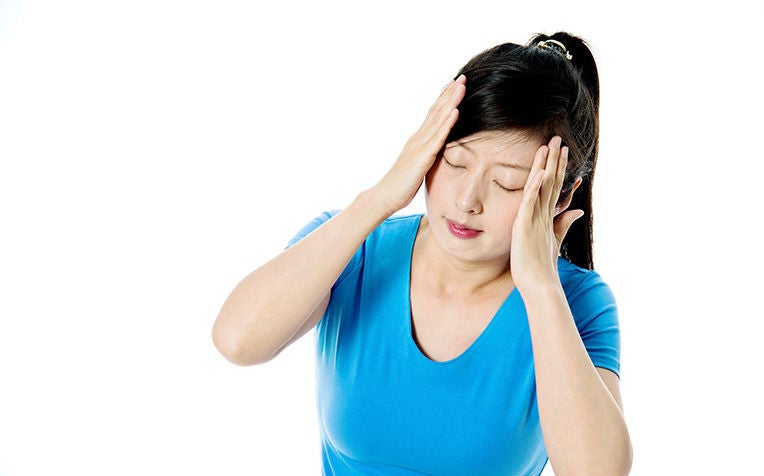
Hot flushes is a condition some women experience during menopause.
Menopause is a natural event in a woman’s life. The average age of menopause is 51 but can range from age 45 to 55. At around age 45, a woman’s body goes through certain changes, like the gradual cessation of ovary function. This leads to a halt in menstrual periods, eventually ending fertility.
During the pre-menopausal period known as perimenopause, the fluctuating levels of oestrogen and progesterone can cause symptoms like irregular periods. Cycles may become shorter like weekly or longer. Some women may experience hot flashes night sweats, disturbed sleep. This in turn can cause mood swings, headaches, fatigue and sometimes reduced libido.
However, every woman’s experience of menopause is different. “For some, menopause can come with the dreaded hot flushes, called night sweats when they happen at night. For the majority, it can be quite uneventful,” says Dr Yong Tze Tein, Senior Consultant at the Department of Obstetrics and Gynaecology, Singapore General Hospital (SGH), a member of the SingHealth group.
What are hot flushes?
Hot flushes, also known as hot flashes, are primarily caused by the hormonal changes that occur during menopause.
Dr Yong explains: “A hot flush is an unpleasant transient sensation of heat in the skin, mainly in the upper part of the body. The face becomes red while sweat may appear on the face, neck and trunk. It may even be accompanied by palpitations or sleep interruption.”
Typically, a hot flush lasts about four minutes, but it can vary from a few seconds to 30 minutes.
Hot flushes are more common during the perimenopausal period. “In fact, this is the primary reason why women seek medical treatment,” observes Dr Yong. “For the majority it settles after a few months, for some it lasts longer and rarely it can occur for more than five years.”
Hot flushes during menopause can also be caused by environmental factors, lifestyle habits or certain medications. Watch out for triggers like:
- Warm drinks, especially caffeinated beverages like coffee
- Spicy food, e.g. chilli
- High temperatures, such as in saunas
- Hot weather
- Warm clothing
- Stress
Managing menopause symptoms with hormone replacement therapy (HRT)
There are a few ways to manage bothersome menopausal symptoms like hot flushes. Hormone replacement therapy (HRT) alleviates the symptoms of menopause by increasing the low levels of oestrogen in the body.
Dr Yong explains: “HRT is the most effective at relieving hot flushes and night sweats. The patient receives a small daily oral dose of oestrogen and ptogestogen. Side effects can include nausea, breast tenderness and fluid retention.” For patients with vaginal dryness, there is local oestrogen which has minimal side effects and risks. For patients who have low libido, they may benefit from tibolone which has some androgenic properties.
According to a US-based study (Women’s Health Initiative, WHI), women on HRT have a slightly higher risk of breast cancer which increases with duration of use. “There were 8 per 10,000 more cases in the HRT group. The risk to the individual is almost negligible but because of this concern, there must be definite clinical reason for HRT as in any medication. Treatment should be as long as necessary and contrary to the past when women are advised not to take it longer than five years, it is deemed quite safe if women take it up to 10 years from the time of menopause,” says Dr Yong. Women can always have a short trial of HRT to see if alleviates their symptoms which is very safe.
Alternatives to HRT include phyto-oestrogens, bio-identical hormones, anti-depressants, evening primrose oil and vitamins. However evidence for alleviation of symptoms is not as good and their safety profiles are not as well studied.
Alternative management options for menopause symptoms
- Phyto-oestrogens, which are plants with hormone-like effects, e.g. black cohosh
- Anti-depressants, e.g. Prozac
- Evening primrose oil Vitamins, e.g. vitamin E
- Bio-identical hormones, which are lab-manufactured hormones that are identical to natural hormones on a molecular level
Menopause is a natural part of life, and is a significant milestone for every woman. Although often times intervention is not necessary, it is a time that most women begin to take stock of their health. Go for your screening mammogram, Pap smear, blood test for diabetes and cholesterol, stool for occult blood or colonoscopy. Start exercising if you have not done so as it is the most effective anti-ageing medicine. If you are finding it difficult to cope with menopause symptoms, don’t hesitate to consult your doctor.
Ref: N18
Contributed by


















 Get it on Google Play
Get it on Google Play